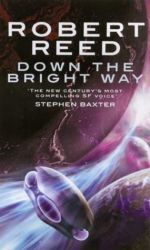Robert Reed’s Down The Bright Way (Orbit, 1991) starts off like an ordinary book. There are seemingly infinite versions of Earth, connected together by the “Bright,” a method of travel invented long ago by the mysterious Makers. There’s a group of people, the Wanderers, travelling down the Bright searching for the Makers, and they’ve just reached our Earth—they’ve offered help solving our climate problems and colonizing our galaxy as long as we create peace and a world government and give them places to set up some stations on their endless voyage.
That would be enough for most books, wouldn’t it—the Wanderers arrive on Earth and interact with us, their wisdom, their mysterious motivations, their quest, being offered the vastness of our universe but being shut away from the vastness of the other Earths down the Bright Way. I can imagine a whole novel right there, maybe a whole series of novels. Or take the Wanderers, I can imagine a whole series of novels in which they go on to discover and help other worlds and deal with their problems, maybe finding hints of the Makers along the way.
For Reed, all that’s just the background. His first point of view character is a human pretending to be a Wanderer. Kyle has studied all their broadcasts and information, he’s become an expert on them, and now he’s wearing clothes like theirs and acting like one of them, just for the fun of it. Meanwhile, there are some weird body-snatching aliens who call themselves Termites who hate the Wanderers and have infiltrated them with the intention of kidnapping their leader, Jy. And there’s Jy, who started the quest for the Makers more than a million years ago. Kyle takes his girlfriend to see Jy and by bad luck they’re there at the time of the kidnapping. They’re snatched off down the Bright, and after that things start to get really weird.
This isn’t a book to give someone new to SF. It’s idea dense, which is characteristic for Reed, and it assumes the SF-reading protocols and goes beyond them. Yet it is—again characteristically—a deeply character-based book. Reed’s really good at getting into the heads of his protagonists. Here, especially, some of those protagonists heads are very strange places. It’s very strange and it’s very good, and it isn’t at all what anyone else would have done with the idea. It has very memorable characters and a very surprising plot. I thought reading it again forewarned I might find it less totally weird, but no. I’ve just come to accept that Reed is ineluctably weird, and the way to enjoy his books is to expect that I’m going to get whiplash a few times as he goes with the deep-level unexpected twists. I sometimes want him to slow down a little and linger, but he doesn’t seem capable of it. I far more often get bored with a slow pace than jangled with a fast one, and indeed this is one of the few books I really think could reasonably have been a little longer. Re-reading it is the intellectual equivalent of watching fireworks from a roller-coaster.
If you like science fiction to make you think and take you to places you’ve never been before, you’ll probably enjoy this a lot. If you’s like to try Reed with a little less of the whiplash, I really like his short work, which tends to have a manageable density of ideas per story. Some of it has been collected as The Dragons of Springplace.
Jo Walton is a science fiction and fantasy writer. She’s published eight novels, most recently Half a Crown and Lifelode, and two poetry collections. She reads a lot, and blogs about it here regularly. She comes from Wales but lives in Montreal where the food and books are more varied.










